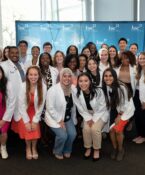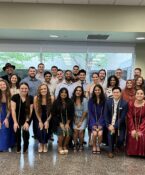Music & Medicine: Unique collaboration combines performing arts and science
When Eri Yoshimura begins to play, beautiful music fills the air. Her eyes close, and her body sways in time to the prelude. Her small hands glide over the keyboard gracefully, fluidly, as if they were tiny ballerinas on a miniature stage.
When she’s not performing, though, this University of North Texas (UNT) piano performance doctoral student is part of a collaborative study between the Denton campus and the UNT Health Science Center designed to measure the benefits to a pianist’s hands when using a special modified keyboard. This information can then be used to educate musicians who teach musicians and help prevent pianists – especially those with small hands – from developing pain caused by playing keyboards.
"We’re looking at hand function in piano players," said Rita Patterson, PhD, professor and director of the Osteopathic Heritage Foundation Physical Medicine Core Research Facility (OHFPMCRF). "We’ve developed hardware and are collecting data on hand position and function while playing piano."
The study is funded by the Joint Institutional Seed Research Program, an intramural grant designed to foster collaborative, innovative research conducted jointly by UNT and the UNT Health Science Center faculty – in this case Patterson; Shrawan Kumar, PhD, OHFPMCRF professor; and Kris Chesky, PhD, director of UNT’s Texas Center for Music and Medicine.
Yoshimura has studied piano-related pain among pianists in the past. She and Chesky published a paper in September 2006 concluding that 86 percent of college students majoring in piano experienced playing-related pain, with lack of flexibility and small hand span as contributors. This Joint Institutional Seed Research grant will allow PMI researchers to quantitatively measure what happens when a player sits down at a keyboard and begins to play.
One possible answer to alleviating the pain certain players feel while performing is the ergonomically modified Steinway piano that UNT students use in an effort to reduce such problems. The keyboard has narrower keys designed specifically for performers with smaller hands.
"We’re measuring hand size, hand position and how hard they’re hitting the keys," Patterson said. "Our technology will give us a thorough motion analysis as [the student subject] plays. There are 30 students, and we’re gathering enough data to keep me busy for a long time. We can easily have two more dissertations worth of material."
Patterson said the researchers are using sensors on the players’ hands that measure how far the hands must move to reach some of the chords common in piano pieces. Sensors under the piano keys measure how hard the player strikes the key while playing.
"We’re working on synching these systems properly," Patterson said. "This will make the data easier to analyze."
Yoshimura has played on the modified keyboard in the past – her first concert on the new piano, also the first at UNT, was a performance in 2006 of the complete 24 Preludes by French composer Claude Debussy.
"We are the first school to offer this [modified keyboard] to students," Chesky said. "It’s a major departure from the norm and hugely significant because many people pursuing piano at the college level are Asian females. But this population has smaller hands than the average male, for whom standard pianos were designed.
"It’s like someone who is used to driving a 1987 Impala suddenly getting into a Ferrari. They just have much more flexibility and ease of playing. It’s really quite remarkable."
Yoshimura, who came to UNT from Osaka, Japan, 10 years ago to pursue a second bachelor’s degree in music, a master’s degree and now a doctoral degree, said traditionally sized keyboards do cause her pain.
"I have very small hands. When I span a chord or octave, I have to stretch my hands a lot, so I feel the tension in my arms," Yoshimura said. "There are many pieces with big chords, so the repertoire I can play is limited."
"Musicians are like athletes: they’re highly motivated, and they won’t tell you when they’re in pain," Patterson said. "They just keep playing. Dr. Chesky has found that the repetitive use of certain muscles, hunching over, playing 24/7, causes musculoskeletal problems. We’ve partnered to look at this. Hopefully we’ll have a long history together."
This dual-campus project has since grown, though, to include a third. George Kondraske, PhD, professor of electrical and biomedical engineering at the University of Texas at Arlington and founding director of UTA’s Human Performance Institute, is joining the investigation.
Patterson said she had heard of Chesky’s work with musicians, studies for which Kondraske had fashioned hardware.
"Dr. Kondraske modified what Dr. Chesky had to fit our needs," she said. "Because we both have history with him, we’re rolling him into this project, and he will be included in any proposals for additional funding."
Patterson said despite the distance between the three campuses, the study has proved to be a productive partnership.
"If you have competent people on each end, it works," she said. "We’ve been to the Denton campus a couple of times to see the data collection. And e-mail’s great."
The team hopes to continue this pilot program with more grants.
"We’ll probably have enough data with this initial study to publish, but it’s absolutely crucial that we expand this study and apply for federal funding," she said.





Social media